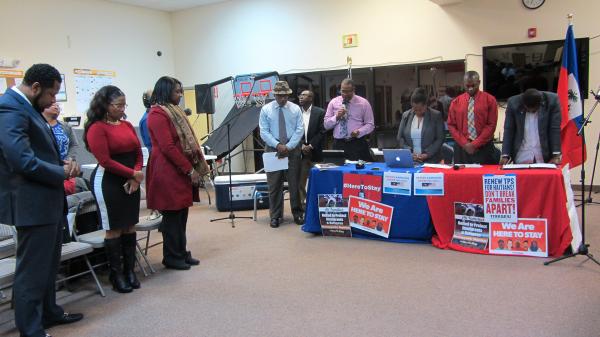November 22, 2017

Advocates gathered in Dorchester on Tuesday night to talk about a path forward for TPS holders. Jennifer Smith photo
In the aftermath of the Trump administration’s decision to end temporary protected status (TPS) for Haitians in the US by July 2019, community leaders, advocates, and elected officials in Massachusetts railed against the order and vowed to spend the next 18 months fighting for a permanent solution.
The humanitarian program, enacted in 2010 after the Haitian earthquake, impacts almost 60,000 Haitian TPS-holders in the states, including some 5,000 currently living and working in Massachusetts. Nationals of 10 countries, including Haiti and Nicaragua, are allowed to remain in the United States legally if a country is unable to handle the return of those people because of war or natural disasters.
Editorial: A cruel strike at Haitians is latest White House outrage
Boston’s highest concentrations of Haitian residents are in Mattapan, along Blue Hill Avenue, as well as Roxbury, Dorchester, and Hyde Park.
Haiti has been walloped by the earthquake and subsequent disasters, including a hurricane and an ongoing cholera epidemic. The country is just not in a state to receive tens of thousands of returning Haitians, advocates say, who may be forced to leave behind their American citizen children.
Holden Pierre, a 24-year-old TPS holder, has been in the US since he was 7 years old, having come here with his mother. He said the extension was a “minor victory that gave us time so we can push for a permanent solution.”
Pierre said his status has allowed him to work, be involved in his community, and help support his family. “America needs us,” he said. “Each immigrant brings something very different, and we want to be part of the solution.”
The Boston Foundation reported Tuesday that Haitians with TPS in the Greater Boston area contribute $25 million to the local economy.
More than 30 individuals invested in the TPS program gathered for a press conference in the Kay Pam Center in Dorchester on Tuesday. They said the disruption to families, communities, and businesses would be “catastrophic.”
“It is time for us to come together and work as hard as we can to make sure that this temporary status stays forever,” said Géralde Gabeau, executive director of the nonprofit Immigrant Family Services Institute in Roslindale, at the Kay Pam Center. “We have to work together because we need a permanent, permanent fix to this problem, and we believe that we can complete that.”
Organizers for immigrant, student, and advocacy groups are planning days of action, rallies, and healing gatherings in the coming months.
State Sen. Linda Dorcena Forry, the daughter of Haitian immigrants, said the next year and a half will be a time for sustained organization.
“This outcome is tempered only by the reality that many of the forces on the other side of this debate sought an immediate expulsion of Haitian nationals with TPS status,” she wrote. “Instead, what we have now is an 18 month window in which we must plan, organize, advocate and persist in our collective work to protect the best interests of Americans and Haitians alike; to strive to protect human rights at its most fundamental level.”
Earlier on Tuesday, at the annual Thanksgiving luncheon, Attorney General Maura Healey said her office plans to advocate for a continuation of temporary protected status and lobby for a more permanent solution through Congress, working with MIRA, Irish International Immigration Center and others.
"In the face of yet another cruel, reckless, illegal, unconstitutional and un-American act by our president you stand strong in the faith and in the belief that it is in and through our immigrant communities that this country is great and will be only greater," Healey said. "We just saw the Trump administration double-down on that reckless record that he has developed by announcing that it is going to phase out temporary protected status for Haitians and Nicaraguans. I want you to know you have the full commitment of my office and me in this fight ahead."
Rev. Dieufort Fleurissaint, of Mattapan, said he has been heartened by the state’s response. He thanked Sen. Forry for her solidarity and Gov. Charlie Baker, who sent a letter on Tuesday urging Homeland Security Secretary Elaine Duke to let citizens of Haiti, El Salvador and Honduras remain in the country.
There is a real fear and uncertainty among Haitian families, Pierre said, as they try to figure out their plans for jobs, housing, and their families.
“People are going to be in limbo,” he said.
Information from the State House News Service was used in this report.
Topics:


